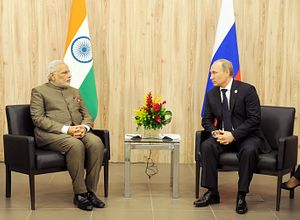Russia is getting ready to host the 2019 edition of the Tsentr military exercises in the middle of September. The exercise is usually conducted by the Russian armed forces alone, but in a sign of its expansion, back in 2018, Russia invited China to join. The joint exercise ended up being of the biggest multinational military exercises ever, involving a total of about 300,000 troops.
This year, interestingly, Russia invited India to be part of this exercise. New Delhi had accepted the invitation and is expected to be participating. But the recent tensions between India and some of the other participants should make for an interesting dynamic at the event.
Russia has invited a number of Central Asian countries as well as China to the exercise, in addition to India. But according to at least one report, in the Moscow Times, the exercise will include troops from Pakistan also, in addition to Russia, China, India, and four Central Asian Republics — Kazakhstan, Kyrgyzstan, Tajikistan, and Uzbekistan. On the other hand, a report in an Indian newspaper has said that Pakistan will not be part of the 2019 edition of these exercises. A Chinese report on the upcoming exercise also did not mention Pakistan’s participation. Thus it is unclear whether Pakistan has been invited or whether it will take part.
According to the Russian Ministry of Defense, a total of 128,000 troops, more than 20,000 pieces of equipment, 600 aircraft, and up to 15 ships and support vessels will be participating in the upcoming military exercises. New Delhi, according to reports, plans to send 140 military personnel.
The exercise is to be divided into two modules, and will have both a defensive and offensive phase. The first phase of the exercise is to focus on counterterrorism operations, repelling air strikes, reconnaissance and search, and defensive actions whereas the second phase will involve managing troops during massive fire strikes and offensive operations involving simulated hostile forces. As per the Ministry of Defense, these exercises will take place in eight training grounds, including Totsky, Donguz, Adanak, Cherbarkulsky, Yurginsky, Aleysky, and two air defense sites at Ashuluk and Safakulevo.
New Delhi’s acceptance of the Russian invitation is not much of a surprise: India has been keen to demonstrate that its foreign policy continues to maintain a wide set of links. Russia, in particular, is an old strategic partner with which India continues to maintain strong military links. India continues to be deeply dependent on Russian arms in its military forces, and Moscow has been willing to transfer weapon systems such as the Akula-class nuclear-powered submarine (on lease) to India.
India also recently decided to purchase the S-400 long-range air defense missile system from Russia, despite the fact that the United States was very opposed to that purchase and knowing that buying the S-400 could potentially jeopardize any future Indian purchase of advanced American fighter planes such as the F-35. Though Washington is also an important partner for India, New Delhi was reluctant to give in to U.S. demands, especially considering the uncertainties of the Trump administration’s policies.
New Delhi would also not have had much objection to participating along with China in a joint exercise in Russia. India and China have conducted joint bilateral military exercises recently. India has been keen to improve relations with China after the Doklam confrontation in 2017, and Prime Minister Narendra Modi and President Xi Jinping were supposed to hold a second “informal” summit in India, to follow up on the one held in Wuhan last year.
However, the recent Sino-Indian spat over India’s decision to withdraw the provisions of Article 370 of the Indian Constitution and New Delhi’s decision to make the Ladakh region a separate union territory to be administered directly from New Delhi has worsened relations. New Delhi was miffed at China’s active efforts at the UN Security Council to target India. It remains to be seen if this will have any impact on India’s participation in the Tsentr military exercise.
If Pakistan has been invited to the exercise, it will be yet another wrinkle, because Pakistan has vociferously objected to India’s Article 370 decision and it was Islamabad that took the issue to the UNSC. New Delhi will also likely see any Russian invitation to Pakistan to join the exercise as one more example of Moscow’s increasing closeness to Islamabad. New Delhi is already unhappy with Russia’s behavior at the UNSC; this will further deepen Indian unhappiness.
It is extremely unlikely that India will take any dramatic steps, such as withdrawing from the exercise. But Indian discomfort with Russia, which is already growing, is likely to worsen if a Pakistani contingent also shows up at the exercise.

































